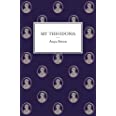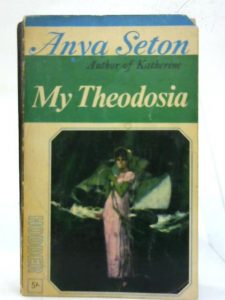Somewhat late to the party, I saw Hamilton last month. Like everyone else, I admired its originality, ensemble work, story telling and concept – with just a minor caveat or two. I was also forcibly struck by how shamefully little I know about the early decades of American independence after the Revolution.

I was, however, familiar with the name of Aaron Burr, Jefferson’s vice-president who shot and killed Hamilton in a duel. And that was because, decades ago, I read Anya Seyton’s 1943 novel, My Theodosia – the story of Burr’s, beautiful, accomplished daughter who died at sea aged 29 and no one knows quite how or why. Seyton, of course, shows us exactly what happened. It’s speculative fiction. And rereading it now, I’m satisfied that her suggestion is as valid as any other although, as far as I can tell, there’s no historical evidence linking her to Captain Merriwether Lewis governor of Missouri Territory who led an expedition into the “wild country” after the Louisiana purchase of 1803.
Theodosia has an exceptionally close relationship with her charismatic, widowed father who owns a beautiful estate in what is now Greenwich Village. Despite her having fallen mutually in love at first sight with Merriwether at the theatre, she is soon married to Joseph Alston, a wealthy South Carolina rice plantation owner: a marriage of convenience. Aaron Burr’s problem is living beyond his means along with, ultimately, absurd delusions of grandeur. He milks Joseph, of whom Theodosia becomes mildly fond, for money and gradually gets into serious, impoverished debt. Moreover there’s a court case, and a spell as a prisoner on remand, relating to the alleged murder of Hamilton. But his daughter never loses her faith in him even when he goes into exile in Europe.
It’s tightly, carefully plotted and if, like me, when you read a historical novel set in an unfamiliar place and/or period you keep thinking “Really?” and reaching for Google, you find that nearly all the big issues, places, people and events in this novel are well researched and factually pretty accurate. I enjoyed some of Seyton’s depiction of historical figures such as Thomas Jefferson and Dolly Madison too.
Some 2023 readers, though, will find My Theodosia an uncomfortable read. Theodosia travels hundred of miles south to live on a hot, swampy, unhealthy plantation in the last years of the eighteenth century. Obviously it runs on slave labour. Joseph’s family owns all the plantations for miles and have literally hundreds of slaves. Of course the Alstons casually use the language of slavery including many wince-inducing words. Whatever any of us might think now, that’s how it was. At the time, in that situation, the language was often simply descriptive rather than perjorative. Theodosia, as a northerner, makes it quite clear that she doesn’t approve of slavery and treats most of ones she gets to know reasonably decently but even she uses the same language – and refuses point blank to use a slave midwife, whose methods are all based on lucky charms, or a black nurse when her son is born. In a way though, Theodosia’s objections, highlight the horror of the slavery system especially when it comes to a pretty young woman named (appropriately as it turns out) Venus.
I’m not sure that a publisher would have the courage to run with this today if it were submitted as a new manuscript because there would be fears that blinkered people would simply see the language and not think through the issues – rather as many did with Lady Chatterley’s Lover. 1943 was a long time before Black Lives Matter, after all. Actually, I think if you look at My Theodosia carefully and open-mindedly you will, I hope, agree with me that the presentation of the slavery issue is pretty sensitive – with Theodosia’s attitude continually contrasted with Joseph’s.
agree with me that the presentation of the slavery issue is pretty sensitive – with Theodosia’s attitude continually contrasted with Joseph’s.
Next week on Susan’s Bookshelves: Giovanni’s Room by James Baldwin